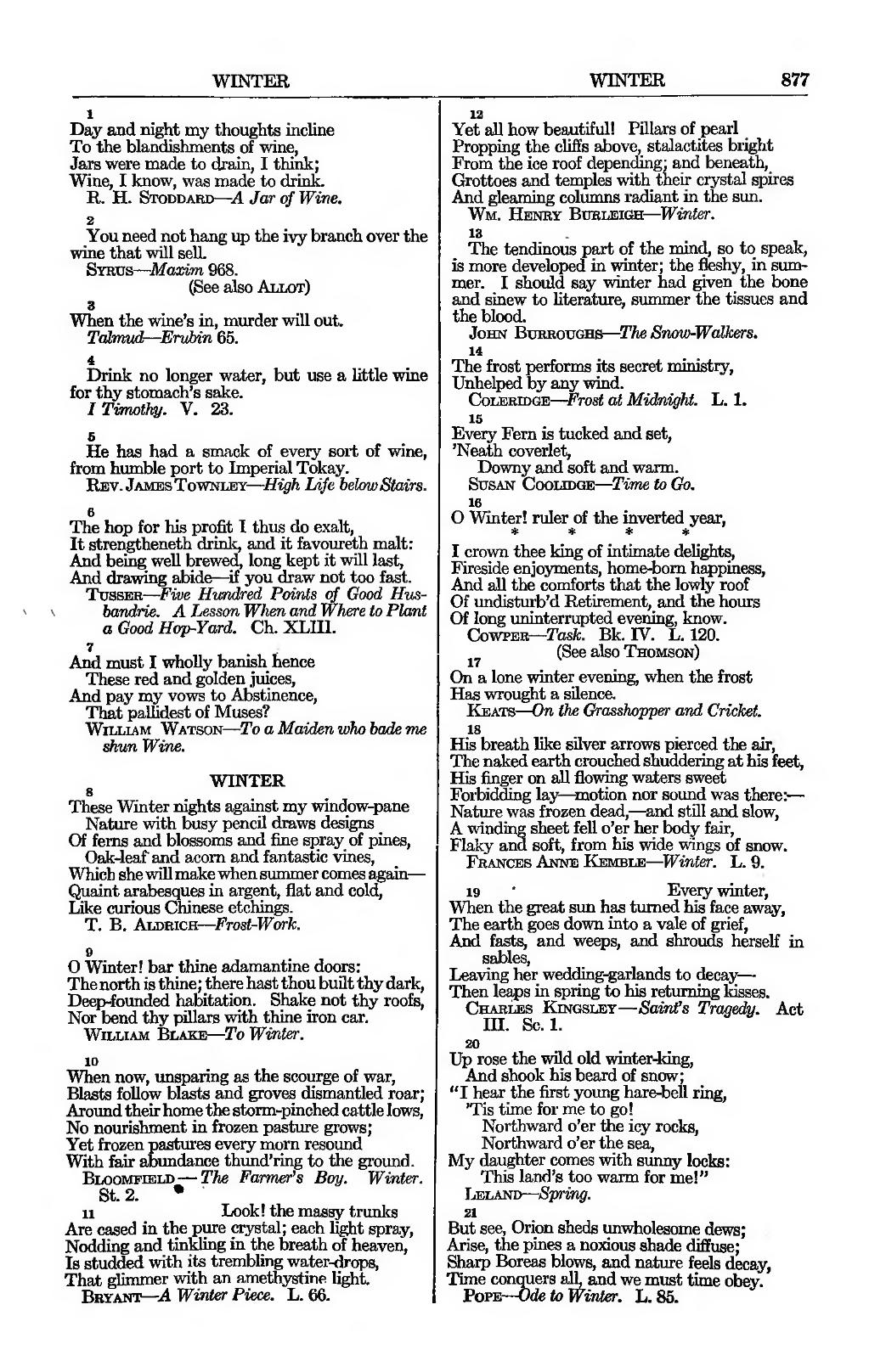Day and night my thoughts incline
To the blandishments of wine,
Jars were made to drain, I think;
Wine, I know, was made to drink.
You need not hang up the ivy branch over the wine that will sell.
Syrus—Maxim 968.
When the wine's in, murder will out.
Talmud—Erubin 65.
Drink no longer water, but use a little wine
for thy stomach's sake.
I Timothy. V. 23.
He has had a smack of every sort of wine,
from humble port to Imperial Tokay.
Rev. James Townley—High Life below Stairs.
The hop for his profit I thus do exalt,
It strengtheneth drink, and it favoureth malt:
And being well brewed, long kept it will last,
And drawing abide—if you draw not too fast.
Tusser—Five Hundred Points of Good Husbandrie. A Lesson When and Where to Plant
a Good Hop-Yard. Ch. XLII1.
And must I wholly banish hence
These red and golden juices,
And pay my vows to Abstinence,
That pallidest of Muses?
WINTER
These Winter nights against my window-pane
Nature with busy pencil draws designs
Of ferns and blossoms and fine spray of pines,
Oak-leaf and acorn and fantastic vines,
Which she will make when summer comes again—
Quaint arabesques in argent, flat and cold,
Like curious Chinese etchings.
T. B. Aldrich—Frost-Work.
O Winter! bar thine adamantine doors:
The north is thine; there hast thou built thy dark,
Deep-founded habitation. Shake not thy roofs,
Nor bend thy pillars with thine iron car.
| author = William Blake
| work = To Winter.
When now, unsparing as the scourge of war,
Blasts follow blasts and groves dismantled roar;
Around their home the storm-pinched cattle lows,
No nourishment in frozen pasture grows;
Yet frozen pastures every morn resound
With fair abundance thund'ring to the ground.
Bloomfield—The Farmer's Boy. Winter.
St. 2. *
Look! the massy trunks
Are cased in the pure crystal; each light spray,
Nodding and tinkling in the breath of heaven,
Is studded with its trembling water-drops,
That glimmer with an amethystine light.
Yet all how beautiful! Pillars of pearl
Propping the cliffs above, stalactites bright
From the ice roof depending: and beneath,
Grottoes and temples with their crystal spires
And gleaming columns radiant in the sun.
The tendinous part of the mind, so to speak,
is more developed in winter; the fleshy, in summer. I should say winter had given the bone
and sinew to literature, summer the tissues and
the blood.
John Burroughs—The Snow-Walkers.
The frost performs its secret ministry,
Unhelped by any wind.
Coleridge—Frost at Midnight. L. 1.
| author =
| work =
| place =
| note =
| topic = Winter
| page = 877
}}
{{Hoyt quote
| num = 15
| text = Every Fern is tucked and set,
'Neath coverlet,
Downy and soft and warm.
Susan Cooltdge—Time to Go.
Winter! ruler of the inverted year,
crown thee king of intimate delights,
Fireside enjoyments, home-born happiness,
And all the comforts that the lowly roof
Of undisturb'd Retirement, and the hours
Of long uninterrupted evening, know.
On a lone winter evening, when the frost
Has wrought a silence.
His breath like silver arrows pierced the air,
The naked earth crouched shuddering at his feet,
His finger on all flowing waters sweet
Forbidding lay—motion nor sound was there:—
Nature was frozen dead,—and still and slow,
A winding sheet fell o'er her body fair,
Flaky and soft, from his wide wings of snow.
Frances Anne Kemble—Winter. L. 9.
| author =
| work =
| place =
| note =
| topic = Winter
| page = 877
}}
{{Hoyt quote
| num =
| text = <poem>Every winter,
When the great sun has turned his face away,
The earth goes down into a vale of grief,
And fasts, and weeps, and shrouds herself in
Leaving her wedding-garlands to decay—
Then leaps in spring to his returning kisses.
Up rose the wild old winter-king,
And shook his beard of snow;
"I hear the first young hare-bell ring,
'Tis time for me to go!
Northward o'er the icy rocks,
Northward o'er the sea,
My daughter comes with sunny locks:
This land's too warm for me!"
Leland—Spring.
But see, Orion sheds unwholesome dews;
Arise, the pines a noxious shade diffuse;
Sharp Boreas blows, and nature feels decay,
Time conquers all, and we must time obey.
